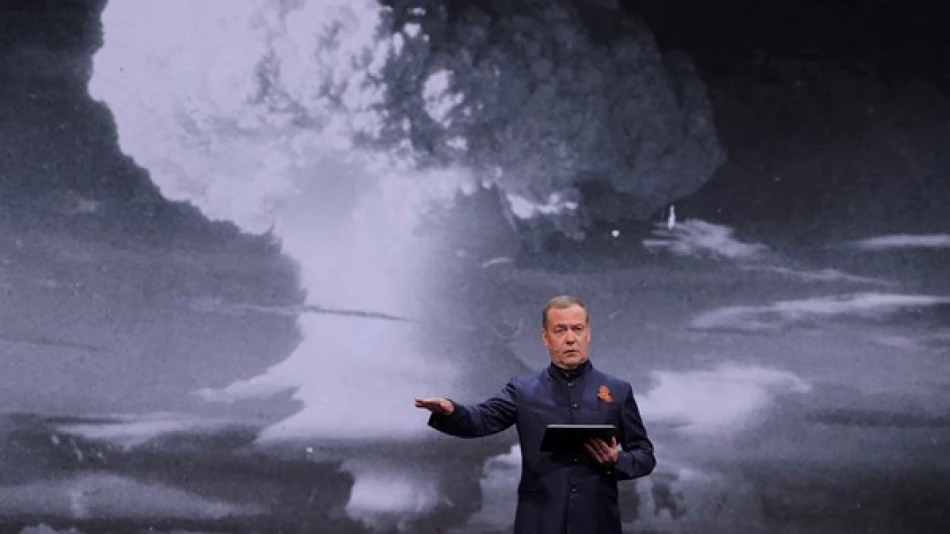
Russia Warned to Prepare for War by Former President Medvedev
Russia Threatens "Preemptive Strikes" as Ukraine War Rhetoric Escalates
Former Russian President Dmitry Medvedev has warned that Moscow is prepared to launch preemptive strikes against Western targets if NATO continues escalating its support for Ukraine, marking a significant hardening of Russian rhetoric as the conflict enters its third year. While denying any plans to attack NATO or European nations, Medvedev's comments signal Russia's growing frustration with Western military aid and suggest Moscow may be preparing to expand the conflict's scope.
The Warning: Conditional Threats with Clear Red Lines
Speaking through Russia's state news agency TASS, Medvedev—who served as Russia's president from 2008 to 2012 and currently holds the position of deputy chairman of Russia's Security Council—dismissed Western concerns about potential Russian attacks on NATO members as "nonsense." However, he simultaneously issued a stark warning about Russia's response to continued Western escalation.
"We must act accordingly. Respond fully. And if necessary, deliver preemptive strikes," Medvedev stated, characterizing the current situation as a "full-scale war" involving Western missiles, satellite intelligence, and sanctions packages rather than merely a proxy conflict.
Strategic Context: Why This Matters Now
Escalation Ladder in Ukraine
Medvedev's comments come as Western military support for Ukraine has steadily intensified, with NATO countries providing increasingly sophisticated weapons systems including long-range missiles, advanced air defense systems, and intelligence sharing. This represents a significant shift from the initial provision of defensive equipment in early 2022 to what Russia now perceives as direct Western participation in the conflict.
Historical Precedent for Russian Doctrine
Russia's mention of preemptive strikes aligns with its established military doctrine, which has long included provisions for first-use of nuclear weapons if the state's existence is threatened. However, extending this concept to conventional preemptive strikes against Western targets would represent a dangerous escalation that could trigger Article 5 of NATO's collective defense treaty.
Reading Between the Lines: Strategic Messaging
The choice of Medvedev as messenger is significant. Once considered a moderate voice during his presidency, he has increasingly adopted hawkish positions since returning to the Security Council. His comments likely serve multiple purposes: testing Western resolve, preparing Russian public opinion for potential escalation, and signaling to domestic hardliners that the Kremlin remains committed to its Ukraine objectives.
The Kremlin's response—describing Medvedev's remarks as his "personal opinion" while endorsing his concerns about European "confrontation"—suggests a deliberate strategy of maintaining plausible deniability while amplifying the threat.
Global Implications: Markets and Geopolitical Stability
Such rhetoric typically drives volatility in energy markets and defense stocks, while reinforcing the fragmentation of global trade networks. European defense spending, already accelerating since 2022, may face additional pressure to increase rapidly—a development that could reshape fiscal priorities across the continent.
For NATO members, particularly those bordering Russia, these threats underscore the delicate balance between supporting Ukraine and avoiding direct confrontation with a nuclear-armed adversary. The alliance now faces the challenge of maintaining credible deterrence while preventing the conflict from expanding beyond Ukraine's borders.
What's Next: Escalation or Bluster?
While inflammatory rhetoric has become routine in Russian official discourse, the specific mention of preemptive strikes represents a notable escalation in language. Whether this translates to actual policy changes will likely depend on Western responses and the trajectory of the conflict in Ukraine itself.
The warning also reflects Russia's strategic dilemma: unable to achieve decisive victory in Ukraine despite nearly two years of fighting, Moscow may be signaling its willingness to expand the conflict's scope rather than accept defeat. This dynamic makes the coming months particularly critical for both diplomatic efforts and military preparedness across Europe.
Most Viewed News

 Layla Al Mansoori
Layla Al Mansoori






